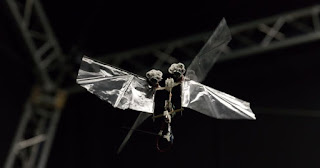New Underwater Propulsion like Fish

Tunabot - Fast as Tuna, Next G Underwater Vehicle Propulsion Source: University of Virginia Prototype for Next G Underwater Vehicle Propulsion The tuna is one of the fastest fish in the sea. A mechanical engineering team from University of Virginia in collaboration with biologists from Harvard University have invented a robofish that can swim as fast as a yellowfin tuna. The team says it's not about the robot. It's about inventing a new, faster and more efficient underwater propulsion system for manned and unmanned underwater vehicles. Physics of Fish Propulsion At Harvard and UVA, Tunabot is tethered in a large flow tank with a green laser to measure fluid motion as it swims. Yellowfin tuna grow to 7 feet. The Tunabot is 10 inches long. The purpose of this research is to better understand the physics of fish propulsion to develop the next generation of underwater vehicles with fish like propulsion system. The team says the ult...
